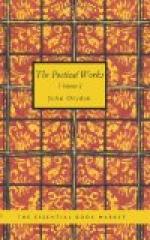[Footnote 42: ‘Cacus:’ see Virgil in Cowper’s translation, 2d vol. of this edition.]
[Footnote 43: ‘Albemarle:’ Monk.]
[Footnote 44: ‘Flix:’ old word for hare fur.]
[Footnote 45: ‘Allen:’ Sir Thomas Allen, admiral of the white. ’The Achates:’ Sir Robert Holmes was rear-admiral of the white.]
[Footnote 46: ‘Leader:’ De Ruyter.]
[Footnote 47: ‘Patron saint:’ St James, on whose day the victory was gained.]
[Footnote 48: ‘Usurper:’ this seems a reference to Cromwell; if so, it contradicts Scott’s statement quoted above in the ‘Life.’]
[Footnote 49: ‘Letted:’ hindered.]
* * * * *
AN ESSAY UPON SATIRE.
BY ME DRYDEN AND THE EARL OF MULGRAVE,[50] 1679.
How dull, and how insensible a beast
Is man, who yet would lord it o’er
the rest!
Philosophers and poets vainly strove
In every age the lumpish mass to move:
But those were pedants, when compared
with these,
Who know not only to instruct, but please.
Poets alone found the delightful way,
Mysterious morals gently to convey
In charming numbers; so that as men grew
Pleased with their poems, they grew wiser
too. 10
Satire has always shone among the rest,
And is the boldest way, if not the best,
To tell men freely of their foulest faults;
To laugh at their vain deeds, and vainer
thoughts.
In satire too the wise took different
ways,
To each deserving its peculiar praise.
Some did all folly with just sharpness
blame,
Whilst others laugh’d and scorn’d
them into shame.
But of these two, the last succeeded best,
As men aim rightest when they shoot in
jest. 20
Yet, if we may presume to blame our guides,
And censure those who censure all besides,
In other things they justly are preferr’d.
In this alone methinks the ancients err’d,—
Against the grossest follies they declaim;
Hard they pursue, but hunt ignoble game.
Nothing is easier than such blots to hit,
And ’tis the talent of each vulgar
wit:
Besides, ’tis labour lost; for who
would preach
Morals to Armstrong,[51] or dull Aston
teach? 30
’Tis being devout at play, wise
at a ball,
Or bringing wit and friendship to Whitehall.
But with sharp eyes those nicer faults
to find,
Which lie obscurely in the wisest mind;
That little speck which all the rest does
spoil,
To wash off that would be a noble toil;
Beyond the loose writ libels of this age,
Or the forced scenes of our declining
stage;
Above all censure too, each little wit
Will be so glad to see the greater hit;
40
Who, judging better, though concern’d
the most,




